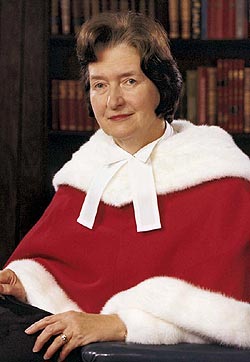
The first woman appointed to the Supreme Court of Canada - Honourable Bertha Wilson
Bertha Wilson was born in Kirkcaldy, Scotland, on September 18, 1923. She is the daughter of Archibald Wernham and Christina Noble. She attended the University of Aberdeen, Scotland, and graduated with an M.A. in 1944. She continued her education at the Training College for Teachers in Aberdeen, obtaining her diploma in 1945. She married the Reverend John Wilson in December 1945 and they emigrated to Canada in 1949.
In 1955, she enrolled at Dalhousie University to study law, and three years later she completed her LL.B. and was called to the bar of Nova Scotia. In 1959 she was called to the bar of Ontario and practised law in Toronto with Osler, Hoskin & Harcourt for 16 years.
Wilson was the first woman appointed to the Court of Appeal for Ontario in 1975. In March, 1982, she became the first woman appointed to the Supreme Court of Canada, nominated by Pierre Trudeau.
Wilson's noteworthy Supreme Court rulings include R v. Morgentaler in 1988 (opinion striking down abortion law), R v. Lavallée in 1990 (battered-wife syndrome as self-defence), Operation Dismantle v. R in 1985 (judicial review), the minority decision in R v. Stevens (1988) which was adopted later in R v. Hess , R v. Nguyen in 1990 (mens rea and statutory rape), Kosmopoulos v. Constitution Insurance Co. of Canada (piercing the "corporate veil"), the dissenting opinion in McKinney v. University of Guelph in 1990 (mandatory retirement), Andrews v. Law Society of British Columbia in 1989 (equality rights test), and Sobeys Stores Ltd. v. Yeomans in 1989 (interpretative authority of tribunals) which are among the foundational cases interpreting the Canadian Charter of Rights and Freedoms that was enacted in 1982, the year that she was appointed to the Supreme Court. She served on the Supreme Court for eight years and retired on January 4, 1991.
Wilson was appointed a Commissioner of the Royal Commission on Aboriginal Peoples.
The Royal Commission on Aboriginal Peoples (RCAP) was a Canadian royal commission established in 1991 with the aim of investigating the relationship between Indigenous peoples in Canada, the Government of Canada, and Canadian society as a whole. It was launched in response to status and rights issues brought to light following events such as the Oka Crisis and the failure of the Meech Lake Accord. The Commission culminated in a final report of 4,000 pages, published in 1996, and set out a 20-year agenda for implementing recommended changes.
Wilson was made a Companion of the Order of Canada in 1992.
Justice Wilson passed away on April 28, 2007, at the age of 83.


